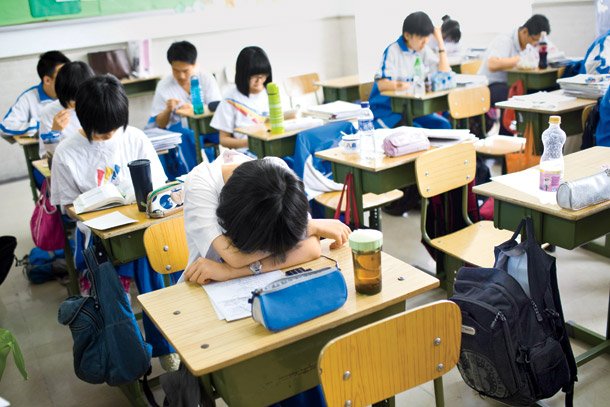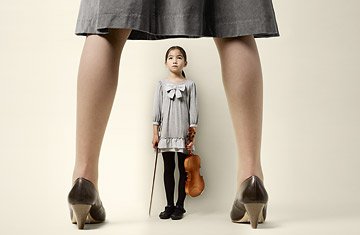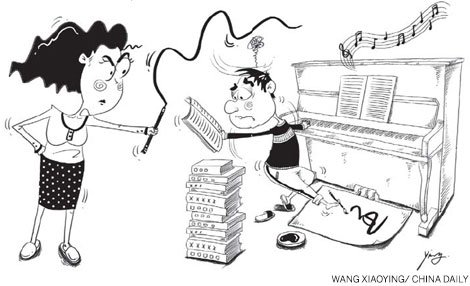"Beat that child so he's not a social outcast!"
I grew up in a Chinese society and was raised by Chinese parents. Like the hundreds of millions of other children in the Chinese School system, a typical school day would see me wake up at 06:00 and be at my desk in school by 07:30. It would be another hour and a half before the teacher would arrive, but me and my classmates would be hard at work preparing for the tests of the day, or studying the mountains of material we are taught each day, making sure we didn't fall behind. Whether it's memorising whole verses of Ancient Chinese prose, or practising algebra solving complicated equations, there was little time to waste.

Suffice to say, my favourite part of the day would be lunch time. In our short 1 hour intermission, I get some time to eat my packed lunch usually consisting of some Steamed Buns, Vegetables, Rice and some Pork. Occasionally my mum would deliver some nice food to help feed my mental appetite which would manifest into real physical hunger. No, there are no fat Children around me, only children with heavy bags under bloodshot eyes, obscured by ever thickening glasses. The less time we spent eating, the more we could spend resting. With just the finite time of one hour, most of us would put our head downs on our desk and fall into REM sleep at an instance. Still, the top student at the front row would eat and study through the lunch hour, showing no signs of fatigue or lapse in determination.

Everyday, we'd line up in height order and sing the national anthem. Tens of thousands of students chanting "Stand up! Stand up! Stand up!" as our flag was raised, a chorus that could be heard miles all around. "Millions of people, all of one mind" reminding us of our strength as a nation, and the power of uniting as one. From the perspective of an outsider, it would appear like a military exercise, and they wouldn't be too far from the truth.
This formality would be followed by "recreation", and this consisted of our class running several laps around the now vacated track and field. We'd have health checks every now and then, which was just getting our height and weight measured. I remember being one of the taller girls in my class, this made me feel some what happy.
In the afternoon, we'd have more classes, and almost everyday we'd have tests on the chapter we just learnt. These were brutal. I don't know why, but everybody seemed to treat these tests like a matter of life or death - including myself. I really cared about my test scores and grades, not only because I hated sitting at the back, but also because I didn't want to feel ashamed for being a miscreant of my class, of society. Perhaps it was also because the consequences for scoring low is a beating with the cane. I never experienced this myself, but I saw plenty of my classmates being punished for their poor grades. It scared me so much so that I couldn't remember a day where I wasn't frantically worrying about my school work, and what tests I had to prepare for.
Such was my life in school. As I grew older, I thought things would get easier, that maybe I would become ritualised to the point of pure conformity and there would be no part of me that despised this system. I was wrong.
Pressures to enter a good high school meant even more stress over tests and exams and fear of falling behind. I was enrolled into after school top up classes for the core subjects; English, Chinese, Science and Maths where I would receive extra tutoring and practice for the upcoming high school entrance exams. These evening classes would often end at night, and I would be left with just an hour or two before midnight, the time I usually slept. In the short 2 hours after evening class, i'd sometimes read some comics and watch some TV, my favourites were Sailor Moon and Crayon Shin-Chan. I'd sit at the dining table with the TV on in the background and get on with my homework until bed time.
Parenting - The Chinese Way
Although my story sounds very tough for a little girl, it was the reality for pretty much all Chinese children growing up in China. I often wondered what the education system was like elsewhere and it wouldn't be until I went to UK for university that I would find out.
Even though I had a tough time in school, I never once felt that my parents had abandoned their love for me. Quite the opposite. There was always a strong sense of closeness with my parents who would do everything they could do enrich my life outside of school time. I was encouraged to do well, but was never scorned for performing badly or for not getting perfect grades. This was something of a surprise to many people in the UK who seemed to think that Chinese parents practised authoritarian parenting.

Perhaps it's partially true, for many Chinese kids who are brought up in the west are still subject to traditional Chinese parenting, they were frequently stereotyped as being overachievers, getting the top grades, going to the top schools, playing musical instruments excellently if a bit robotic. What's the difference?
I stumbled across an article by a Yale Law professor, Amy Chua who is herself a second generation Chinese parent, and she wrote a compelling piece about Chinese parenting for the Wall Street Journal about how Chinese parents are able to raise such stereo-typically successful kids. In her piece, she described how she raised her daughters up, never allowing them to attend sleepovers, have playdates, be in school plays, watch TV or play computer games and even extracurricular activities were chosen for them. And yet, she claimed that these were not indicative of authoritarian parenting.

Later on, Chua points out that she had to reassess her methods of parenting after her daughters began to rebel.
“The Chinese believe that the best way to protect their children is by preparing them for the future, letting them see what they're capable of, and arming them with skills, work habits and inner confidence that no one can ever take away."
This is a very important ethos which I think is central to the philosophy of Chinese parenting and Chinese education.
The belief that effort and hard-work will pay off.
There is a famous quote:
Hard work beats talent when talent doesn't work hard
I think most if not all Chinese parents will emphasise hard work for their children, it's just that in China, the education system is already taking care of that with less intervention from parents. I don't believe that authoritarian parenting is the best approach to parenting, in fact, I don't believe authoritative parenting is either. There is too much focus on academic achievement and too little emphasis on creativity and independent thinking skills.
Some educators in China have begun expressing concern that traditional Chinese parenting doesn't foster creativity or divergent thinking (Tobin et al 1991; Zhao 2007) and they are most likely correct. How can children develop these skills if they are not given the opportunity to practice them?
When all is said and done, there are still positive things to take away from Chinese Parenting and Chinese Education, hard-work, discipline, high expectations, and a drive for betterment is never a bad thing and I believe these are lessons all people can learn from. Chinese or not.
